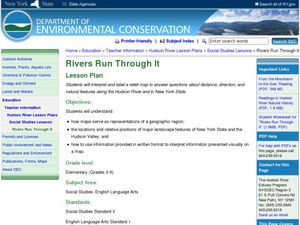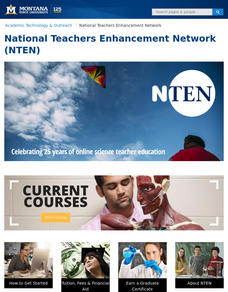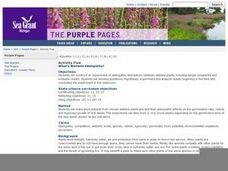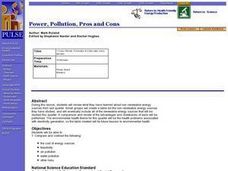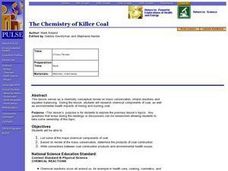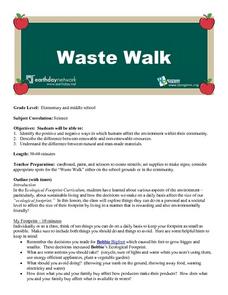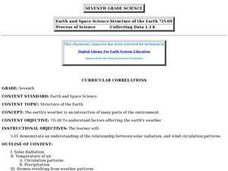Curated OER
Recycling Survey
How many people really recycle recyclables and how do they feel about it? High schoolers create a survey to find out. Once they agree on what questions to include, they each interview four people outside of the classroom....
Curated OER
Transportation Fuels: Biodiesel
Students examine biodiesel as a fuel for transportation. For this biodiesel lesson students complete activities using their critical thinking.
Curated OER
River Run Through It
With vocabulary lists, worksheets, and more, this lesson sets learners on an exploration of the Hudson River area. They read an essay about the area, analyze a relief map of New York State, and complete a worksheet.
Curated OER
Should Soil Be Sterile?
Students determine if the sterilization of topsoil is beneficial to seed germination and plant growth. They grow plants alongside control groups, make and record observations of plant growth and measure plant biomass.
Curated OER
Talking Trash
Define vocabulary related to global waste. Creative thinkers review and illustrate terms for the Global Garbage Picture Dictionary. They play a vocabulary game in which co-operative skills among players in encouraged. A great way to...
Curated OER
Whales
First graders investigate two different types of whales; toothed and baleen. They describe what the different types of whale eat. They listen to a cassette of Dyan Sheldon's, The Whale Song before making stick puppets to dramatize the...
Curated OER
What's Wetland Allelopathy?
Students study plants and what they need to thrive and survive. They make plant extracts from chosen wetland plants and test their allelopathic effects on the germination rate, radicle growth, and hypocotyl growth of test seeds of other...
Curated OER
Waste Management
Four different activities focus on the amount of trash generated and how humans can better manage waste. Learners analyze two days' worth of household garbage, test materials for biodegradability, and rate recyclability of various...
Curated OER
Moldy Jell-O
Mini mycologists plan an experiment to determine what affects the growth of mold on gelatin. A list of available materials is provided, but the procedure needs to be designed by the lab group. A data table is also provided in...
Curated OER
Power, Pollution, Pros and Cons
Students review what they know about non-renewable energy, compare and contrast advantages and drawbacks of each type, such as cost of energy sources, feasibility, air pollution, water pollution, and other risks, and create table listing...
Curated OER
Hog Watch
Sixth graders assume the roles of the staff of an Environmental Regulatory Agency and must assess the amount of damage caused by hog factories. Working in groups, they make recommendations that will decrease the impact of hog factories...
Curated OER
The Chemistry of Killer Coal
High schoolers research chemical components of coal, as well as environmental health impacts of mining and burning coal. They discuss conservation of mass as it relates to combustion of organic compounds.
Curated OER
Environment
Fifth graders receive a general overview of the world's environmental dilemmas thereby understanding the global implications of their actions. They examine their connection to the ecosystem by looking at the influence of the environment...
Curated OER
Health, Pollution, and Safety: Why Should We Care?
Students examine the impact of reducing the carbon dioxide emissions. They identify ways alternative fuels can lessen the effect of emissions on communities. Working in teams they conduct research from various community and Internet...
Curated OER
Variation
High schoolers explore how variation is affected by the environment. They explain ways in which variation can be altered by the environment. Students investigate the effects of sunlight on skin.
Curated OER
Web of Wonder Lesson Plan
Students learn how all living things in an ecosystem are connected in some way. By building their own "web" your class look at energy flow through the food web system and how environmental changes disrupt the system.
Curated OER
Environment: Waste Walk
Pupils assess the positive and negative affects of humans on the environment. The lesson explores ways in which individuals and societies can reduce the negative impact on the environment. By taking a "waste walk" around their campus,...
Curated OER
Killer Coal
Students explore some of the environmental health risks involved with both the mining and burning of coal. They read articles on coal in the Balkan Peninsula, view the photographs, and then discuss what feelings and thoughts they have...
Curated OER
Earth's Weather
Seventh graders learn how solar radiation, latitude, and other factors affect weather. They break into six groups and are assigned a topic to research and to present their findings orally.
Curated OER
The Write Thing to Do
Students examine the proper way to write formal business letters. Students apply the skill to write letters to appropriate environmental protection agencies.
Curated OER
Water Quality Monitoring
Young scholars comprehend the four parameters of water quality. They perform tests for salinity, dissolved oxygen, pH and clarity or turbidity. Students comprehend why scientists and environmental managers monitor water uality and...
Curated OER
Heat Transfer and Pollution
Students perform computer simulations on air dispersion. In this chemistry lesson plan, students calculate energy transfer based on specific heat and temperature change. They explain the causes of smog.
Curated OER
Tell Someone About Earth Day
Learners discuss ways in which grown ups can save energy, money and the Earth in preparation for sending out Earth Day e-cards. They make an Earth Day action list.
Curated OER
We Are All Responsible
Learners conduct research about the issue of conservation and the environment. They focus upon the interdependence of man and nature. They write and discuss the issue of environmental preservation. Students appreciate the importance of...




